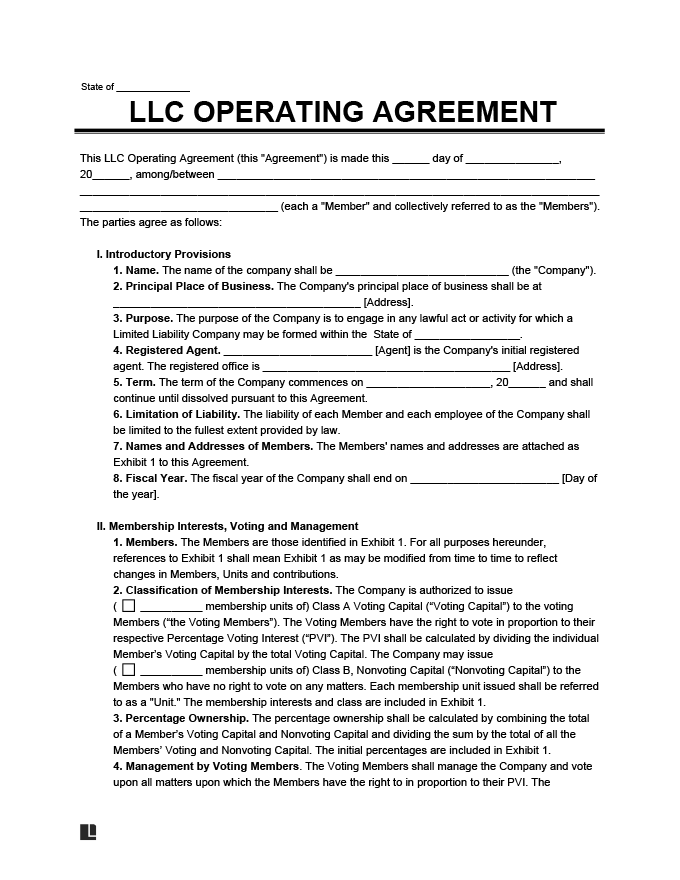LLC Operating Agreement
An LLC Operating Agreement is an internal, written document among members of a Limited Liability Company (“LLC”).
Many states do not require Operating Agreements, but the formality is highly encouraged since an LLC Agreement distinguishes the company as an LLC rather than a sole proprietorship or partnership.
Furthermore, an LLC Operating Agreement prevents disputes by defining each owner’s responsibilities and clarifying how decisions and profits will be distributed internally.
€49,95
1. What is an LLC (Limited Liability Company)?
An LLC is a business structure for companies that combines the legal benefits of a corporation with the tax benefits of a partnership or sole proprietorship.
There are multiple reasons why forming an LLC is a smart business decision.
First, the LLC structure minimizes the personal legal accountability of its members. This is important in the event your company face litigation for any reason.
Second, it protects the personal assets of its members. In other words, the personal property of each member or owner of the LLC is separated from the debts accrued by the company.
A professional limited liability company, also known as a PLLC, is a type of LLC owned and operated by licensed members of the same profession such as dentists, lawyers, and architects. Some states don’t allow licensed professionals to form LLCs — instead they must form a PLLC.
How to Start an LLC
Forming an LLC is an exciting step in your journey as an entrepreneur. Creating an LLC is reasonably simple and (depending on the state of registration) requires few bureaucratic hoops to jump through.
The main steps toward forming an LLC include:
- Register a company name for your LLC
- Select your LLC members
- Choose your management structure
- Draft your LLC operating agreement
- Assign a registered agent
- File all LLC formation documents (i.e. Articles of Incorporation, Operating Agreement, etc.)
- Apply for an EIN (Employer Identification Number)
- Obtain all licenses, permits and tax information
Documents Needed to Form an LLC
There are two main LLC formation documents needed to form a limited liability company — the Articles of Organization and an LLC Operating Agreement.
- Articles of Organization – a set of forms declaring your intent to create an LLC in whichever state you’ve chosen to register in and operate.
Additionally, before forming an LLC, you must first decide the number of members that will be involved in the company, and choose one of the corresponding operating agreements:
- Single-Member LLC Operating Agreement – A written document concerning the identity of the sole member, as well as the scope, function, and limitations of the LLC.
- Multi-Member LLC Operating Agreement – A written document concerning the identities of each member, as well as the scope, function, and limitations of the LLC.
A simple LLC Operating Agreement will identify the following basic elements:
- Binding Authority: which individuals have the authority to sign contracts for the company.
- Duties: the powers of each member and manager of the company.
- Meetings: the frequency of meetings to be held and attended by members each year.
- Members: the names of each person who owns part of the company, and how new members may join or old members leave — done to make internal transitions smoother.
- Ownership: the percentage of each member’s share of the company, often based on the capital contributions or money each person gives.
- Term: how long the company will exist or when it should be dissolved or continued.
- Transferring Interest: how members can buy or sell their interest in the company.
- Voting: whether a majority vote or unanimous consent is required from members on certain decisions that impact the company.
As a reference, people often call LLC operating agreements the following:
- Operating Agreement
- LLC Agreement
- LLC Partnership Agreement
- Business Operating Agreement
- LLC Bylaws
- LLC Membership Agreement
2. Do I Need an Operating Agreement for an LLC?
Individuals looking for more control over how their companies are operated on a day-to-day basis and managed on a long-term, strategic level should invest in an LLC Operating Agreement.
A written LLC Agreement protects a company’s limited liability status by proving that the LLC is a separate legal entity. Without written documentation of an Operating Agreement, a company may appear to be a sole proprietorship or partnership for tax and legal purposes.
Banks, lenders, investors, and professionals will often ask for an LLC Operating Agreement before allowing a company to open a business checking account, secure financing, receive investment money, or obtain proper legal and tax help.
Your state’s default LLC rules will apply if you do not have an Operating Agreement.
For example, if you do not detail what happens when a member of the company leaves or passes away, the state may automatically dissolve your limited liability company based on its laws.
If you want something different than your state’s de facto laws, an LLC Operating Agreement allows you to retain control and flexibility on how the company should operate.
LLC members own a percentage of the company, not shares of a corporation. However, state default rules often assume that each owner has an equal share of the company, even though they may have contributed different amounts of money, property, or time.
An Operating Agreement allows you to:
- specify distributive shares (65% ownership entitles you to 65% of profits and losses)
- or make special allocations (50/50 ownership but you are allocated 65% of profits and losses).
Here is a chart of some of the consequences individual members, and the LLC, may face if there is no written LLC Operating Agreement.
Individual Member |
Company |
|---|---|
|
|
|
|
|
|
Create a Free LLC Operating Agreement now and you can avoid all of these consequences!
3. What Should be Included in an Operating Agreement?
An LLC Operating Agreement should generally include the following:
- Who owns the company based on the contributed money, property, or time.
- What should happen if one member passes away or wants to leave the company.
- Where the company’s principal place of business is located.
- Why only certain individual members can sign contracts on behalf of the company.
- When and how regularly members must meet to discuss company affairs.
- How the profits and losses of the company will be distributed among members.
Here are a few other useful details an LLC Operating Agreement might include:
Company Formation
- Operating Agreement Amendment: any changes to the Operating Agreement must be in writing to be valid.
- Dissolution: when and how the company will be dissolved or ended, including how much each member will get paid based on their ownership percentage or contributions.
Capital Contributions
- Contributions: the amount of money, property, or services each owner gives in the beginning and may be asked to give in the future.
Profits, Losses, and Distributions
- Profits & Losses: how will the money earned or lost be allocated and distributed among each member, either based on ownership percentages or different financial needs or tax brackets of the members.
Management
- Duty of Loyalty: whether the members of the company may invest in competing businesses or whether they are required to share business opportunities with the company.
- Indemnification: the company will defend the members from any legal claims unless the member committed gross negligence or willful misconduct.
- Liability: the individual members are not on the hook for the mistakes of the company or other members unless there was intentional wrongdoing.
- Life insurance: the company may buy life insurance for its members to reduce the capital gain taxes that may be due when the member’s interest is sold at the time of death.
- Management structure: the members must decide if the LLC will be member-managed vs manager-managed, and how managers will be compensated
- Prohibitions: members of the company may not violate the terms of the LLC Operating Agreement, which includes giving their authority to a non-member.
- Voting: which decisions require a majority vote or unanimous consent from the members, either each member gets one vote — “per capita” voting — or each member’s voting power is based on their ownership interest in the company.
Compensation
- Management Fee: how much the manager(s) should be paid for their services.
- Reimbursement: whether the company will reimburse managers or members for out-of-pocket expenses incurred while managing the company.
Bookkeeping
- Accounting: generally accepted accounting principles (GAAP) will be used to keep an accurate and complete record of the company’s accounts.
- Annual Report: a report of the company’s financial condition will be provided each year.
- Auditing: members can request the company accounts be examined.
- Records: accurate records and information about the company will be maintained and members of the company may request a copy.
- Tax: the LLC is treated as a partnership for federal and state income taxes.
- Tax Matters Partner: one member will represent the LLC before the IRS on tax matters.
- Valuation: an independent accounting firm may conduct a fair market value appraisal of the company’s assets and liabilities if a value of the LLC is needed.
Transfers
- Buyout: whether other members of the company have the right to buy another member’s interest in the company if they leave for any reason.
Specificaties: LLC Operating Agreement
|
User Reviews
Plaats de eerste recensie voor “LLC Operating Agreement”
Informatie verkoper
- Nog geen beoordelingen!


























Er zijn nog geen recensies.